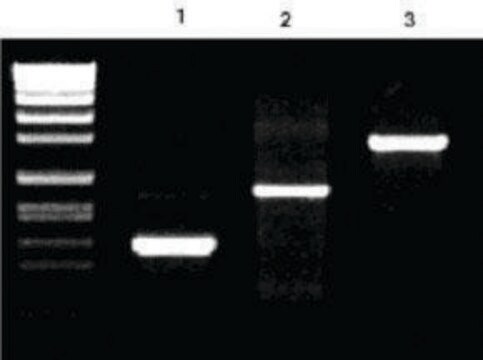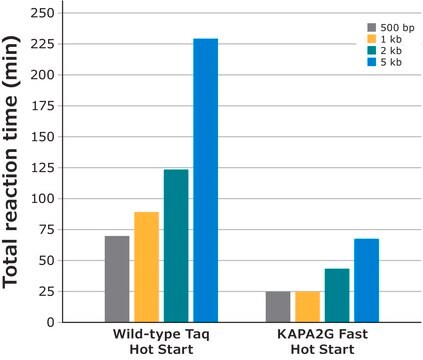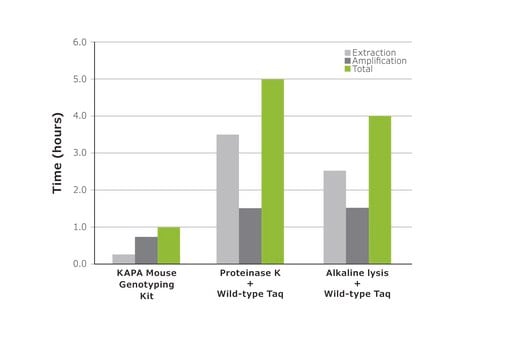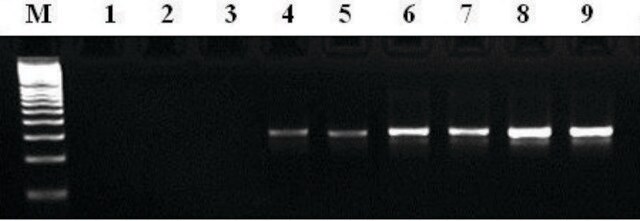PWOPOL-RO
Roche
Pwo DNA Polymerase
Synonym(s):
polymerase, dna, pwo
About This Item
Recommended Products
biological source
microbial (Pyrococcus woesei)
Quality Level
form
liquid
usage
sufficient for ≤200 reactions (11644955001)
sufficient for 200 reactions
sufficient for ≤40 reactions (11644947001)
sufficient for 40 reactions
specific activity
≥5000 U/mL
mol wt
90 kDa
feature
High Fidelity PCR
dNTPs included: no
hotstart: no
packaging
pkg of 100 U (11644947001)
pkg of 500 U (11644955001 [2 x 250 U])
manufacturer/tradename
Roche
concentration
2.5 units/reaction
technique(s)
PCR: suitable
color
colorless
input
purified DNA
solubility
water: soluble
suitability
suitable for enzyme test
application(s)
genomic analysis
life science and biopharma
foreign activity
Endonucleases with lambda-DNA 30 units, none detected
Nicking act using pBR322-DNA ≤30 units, none detected
storage temp.
−20°C
Related Categories
General description
The use of Pwo DNA Polymerase during PCR significantly reduces the occurrence of random amplification errors.
Application
- Due to its proofreading activity, the thermostable Pwo DNA Polymerase has an extremely low error rate, 18-fold lower compared to Taq DNA Polymerase. It is therefore ideal for applications that require the highest possible fidelity in DNA synthesis. It can be applied for High fidelity PCR
- Cloning of PCR products
- Characterization of rare mutations
- PCR
Features and Benefits
- Excellent accuracy (18-fold more accurate than Taq DNA polymerase)
- High thermal stability
- Nearly as processive as Taq DNA polymerase
- Accepts modified nucleotides
Packaging
Quality
- Activity: The enzyme is tested on activated DNA.
- Function: The enzyme is tested in two PCRs, using λDNA and human genomic DNA as templates.
- Proofreading ability: Proofreading activity is assayed according to the laq Iq fidelity assay [Frey, B. & Suppmann, B. (1995) Biochemica 2. 8-9].
- Absence of nucleases: The enzyme is tested on various substrates to ensure the absence of detectable endonucleases, exonucleases, and nicking activity according to the current Quality Control procedures.
Unit Definition
Unit Assay: Incubation buffer for assay on activated DNA
20 mM Tris-HCl, pH 8.8 (20 °C), 50 mM KCl, 2.5 mM MgCl2, 10 mM 2-mercaptoethanol, 0.2 mM of each dATP, dCTP, dGTP, dTTP.
Incubation procedure
12.5 mg activated calf thymus DNA and 0.1 mCi [α-32P]dCTP are incubated with 0.01 to 0.1 U Pwo DNA Polymerase in 50 μl incubation buffer with a paraffin oil overlay at +70 °C for 30 minutes. The amount of incorporated dNTPs is determined by trichloroacetic acid precipitation followed by scintillation counting.
Volume Activity: 5 U/μl
Preparation Note
Modified nucleotides are substrates
Pwo DNA Polymerase accepts modified nucleotides like digoxigenin-dUTP, biotin-dUTP, or fluorescein-dUTP. Thus, it can add these nucleotides to DNA during PCR. These nonradioactively labeled products can be used as a hybridization probe in many applications.
Magnesium concentration
If you use the magnesium-containing reaction buffer supplied with the enzyme, the final MgCl2 concentration in the PCR will be 2.0mM. For other magnesium concentrations (e.g., for optimizing the reaction to accommodate a particular template), use the magnesium-free reaction buffer and add appropriate amounts of the magnesium stock.
Storage and Stability
kept upright to prevent leakage
Other Notes
Legal Information
Kit Components Only
- Enzyme is supplied in storage and dilution buffer
- PCR buffer, with 20 mM MgSO4 10x concentrated
- PCR buffer, without MgSO4 10x concentrated
- MgSO4 stock solution
Hazard Statements
Precautionary Statements
Hazard Classifications
Aquatic Chronic 3
Storage Class Code
12 - Non Combustible Liquids
WGK
WGK 2
Flash Point(F)
does not flash
Flash Point(C)
does not flash
Certificates of Analysis (COA)
Search for Certificates of Analysis (COA) by entering the products Lot/Batch Number. Lot and Batch Numbers can be found on a product’s label following the words ‘Lot’ or ‘Batch’.
Already Own This Product?
Find documentation for the products that you have recently purchased in the Document Library.
Customers Also Viewed
Our team of scientists has experience in all areas of research including Life Science, Material Science, Chemical Synthesis, Chromatography, Analytical and many others.
Contact Technical Service










